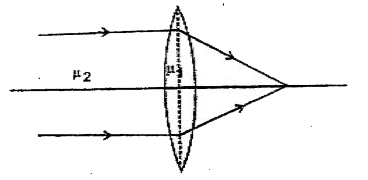A convex lens made of material of refractive index n1 is kept in a medium of refractive index n1. Parallel rays of light are incident on the lens. Complete the path of light emerging from the convex lens, if n1>n2 Solution in Punjabi
μ1= Refractive index of material of lens.
μ2= Refractive index of the medium in which lens is held

When μ1>μ2 then convex lens converges the parallel rays of light incident on the lens.
Topper's Solved these Questions
- REFRACTION OF LIGHTBOOK - BETTER CHOICE PUBLICATIONCHAPTER - REFRACTION OF LIGHTEXERCISE - MOST EXPECTED QUESTIONS
2 Videos
- REFRACTION OF LIGHTBOOK - BETTER CHOICE PUBLICATIONCHAPTER - REFRACTION OF LIGHTEXERCISE - SHORT ANSWER TYPE QUESTIONS
19 Videos
- REFLECTION OF LIGHT BOOK - BETTER CHOICE PUBLICATIONCHAPTER - REFLECTION OF LIGHT EXERCISE - NUMERICALS PROBLEMS
7 Videos
- SEMI CONDUCTOR DEVICESBOOK - BETTER CHOICE PUBLICATIONCHAPTER - SEMI CONDUCTOR DEVICESEXERCISE - Most Expected Questions
6 Videos
Similar Questions
What do you meanby laws of refraction?
View SolutionWhat is meant by power of a lens? What does its sign indicate? State it SI unit, how is it related to the focal length of a lens?
View SolutionA 5 cm long needle lies along the principal axis axis of a concave miror of focal length 20 cm in such a way that the end closer to the pole is 40 cm from it.Find the length of the image of the needle formed by the mirror.
View SolutionCan two P-N junction diodes back to back works as P-N-P transistor?
View SolutionA concave lens made of a material of refractive index n1 is kept in a medium of refractive index n2. A parallel beam of light is incident on the lens. Complete the path of rays of light emerging from the concave lens (i) n1>n2 (ii) n1=n2 (iii) n1<n2.
View SolutionA convex lens made of a material of refractive index n_2 is kept in a medium of refractive index n_1 . A parallel beam of light is incident on the lens. Complete the path of rays of light emerging from the convex lens if (i) n_1 lt n_2 (ii) n_1 = n_2 (iii) n_1 gt n_2 .
View SolutionA convex lens of refractive index μ1 is kept in a medium of refractive index (μ2) . A parallel beam of light is incident on the lens . Draw the path of the rays of light emerging from a lens . If μ1=μ2
View SolutionA concave lens of refractive index mu_(1) is kept in a medium of refractive index (mu_(2)) . A parallel beam of light is incident on the lens . Draw the path of the rays of light emerging from a lens . If mu_(1) = mu_(2)
View SolutionThe refractive index of the material of a concave lens is nv It is immersed in a medium of refractive index n2. A parallel beam of light is incident on the lens. Trace the path of emergent rays
View SolutionA convex lens when placed in a certain medium does not at all act as a lens. The refractive index of lens is n1 and that of medium is n2. the relation between n1 and n2 is
View SolutionA lens made from a material of absolute refractive index n1 is placed in a medium of absolute refractive index n2. The focal length f of the lens is related to n1 and n2 as :
View SolutionA convex lens of refractive index n behaves as a convex lens of smaller power in a liquid of refractive index n1 and as a concave lens in another liquid of refractive index n2. Then relation between n,n1 and n2 is
View SolutionRefractive index of the material of concave lens is mu . The lens is immersed inb a medium of refractive index mu_(1)(mu_(1)gtmu) . A parallel beam of light is incident on the lens. Draw a diagram to show the path of emergent rays.
View SolutionA convex lens made of glass (ng=1.5) is immersed in a liquid of refractive index n1=1.65. The lens then behaves as a
View SolutionThe refractive index of a material of a concave lens is n_1 . It is immersed in medium of refractive index n_2 . A parallel beam of light if incident on the lens. Trace the path of the emergent lays when n_2 = n_1
View SolutionThe refractive index of a material of a concave lens is n_1 . It is immersed in medium of refractive index n_2 . A parallel beam of light if incident on the lens. Trace the path of the emergent lays when n_2 > n_1
View Solution
